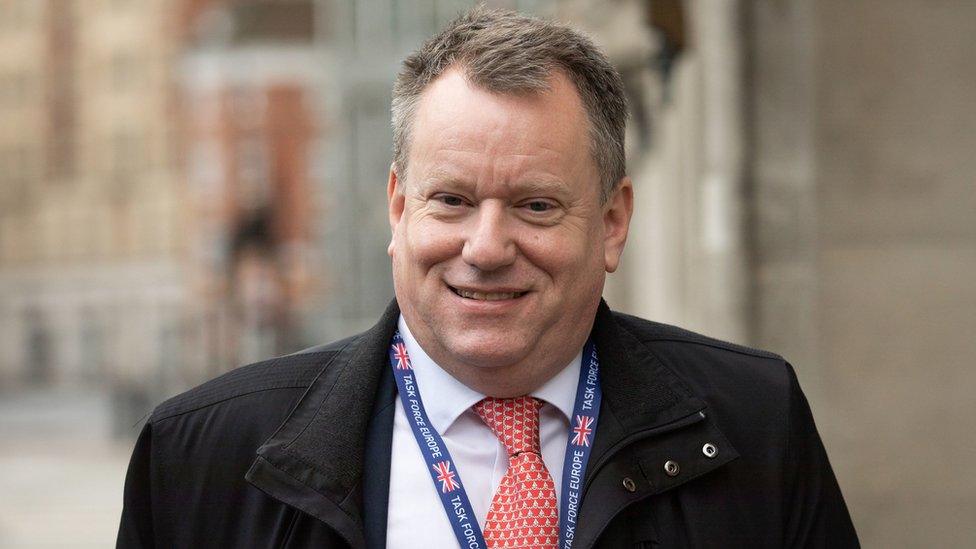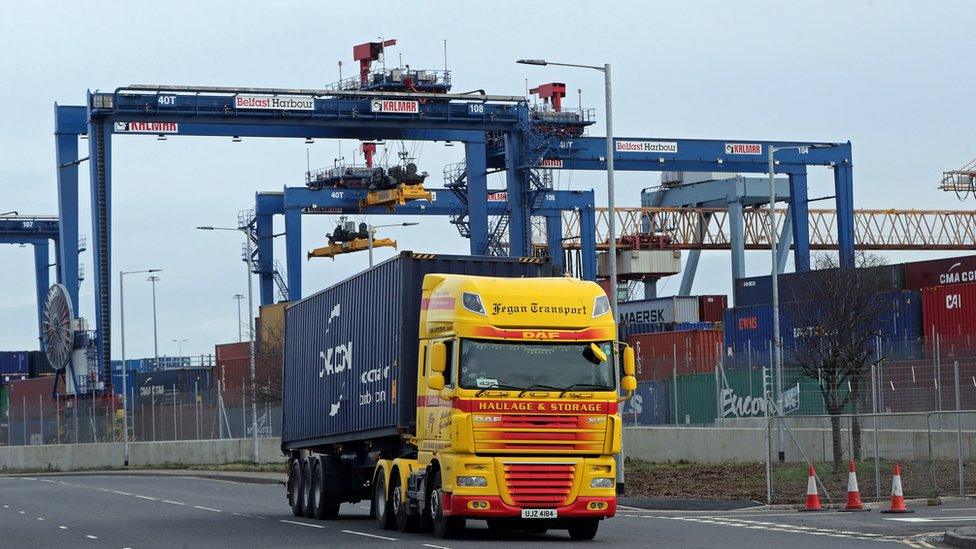Brexit: Lord Frost accuses EU of 'ill will' over UK exit
- Published
- comments

The UK's lead Brexit minister has called on the EU to "shake off any remaining ill will" over the UK's decision to leave the organisation.
Lord Frost said the EU's previous threat to block vaccine exports had "significantly undermined" post-Brexit measures in Northern Ireland.
He insisted the UK's unilateral move to extend grace periods on border checks was legal under the Brexit trade deal.
The EU disputes this, and is preparing to launch a legal challenge.
The UK has said it will delay new checks on goods arriving into Northern Ireland from Great Britain, agreed as part of the UK's withdrawal deal.
EU Commission Vice-President Maroš Šefčovič has called it a "violation" of the part of the deal relating to Northern Ireland and said legal action was imminent.
Writing in the Sunday Telegraph, external, Lord Frost insisted the delayed border checks was a "temporary" measure justified to implement the so-called Northern Ireland Protocol.
The Cabinet Office minister added that the measures were justified by the "fragile" situation in Northern Ireland.

New checks under the UK's Brexit deal have led to disruption at Northern Irish ports
"They are about protecting the everyday lives of people in Northern Ireland, making sure they can receive parcels and buy the usual groceries from the supermarket.
"Without this threat of disruption, we can continue our discussions with the EU to resolve difficulties arising from the Protocol constructively," he added.
Northern Ireland has remained a part of the EU's single market for goods, so products arriving from Great Britain have to undergo EU import procedures.
Checks delayed
Both sides agreed the arrangement as part of the Brexit withdrawal deal, to avoid the need for border checks between NI and the Republic of Ireland.
But it has led to disruption to some food supplies and online deliveries from Great Britain to Northern Ireland, increasing tensions with the EU.
Earlier this week, the UK extended a grace period on new checks on food products from the end of March to October, without the prior agreement of the EU.
It then delayed the introduction of similar checks on parcels, which had been due to come in on 1 April, until the same month.
The logistics industry had said it was not ready to deal with that volume of new administration. The grace periods mean procedures will not yet be fully applied.
Lord Frost, who negotiated the UK's Brexit trade deal with the EU, said he wanted to work with the EU towards "common goals" after the UK formally cut legal ties at the end of the Brexit transition earlier this year.
"I hope they will shake off any remaining ill will towards us for leaving, and instead build a friendly relationship, between sovereign equals," he added.
'Playing games'
But Labour has said the UK's actions risk "plunging Northern Ireland into further instability".
The party's shadow Northern Ireland secretary Louise Haigh said it could mark out the region as "the arena for wider UK-EU conflict for years to come".
And Lord Frost has been accused by a former senior civil servant of "burning trust" with the EU by "playing hard ball" over the protocol.
Philip Rycroft, who led the Department for Exiting the EU between 2017 and 2019, told BBC Radio 4's Westminster Hour while there were issues around the protocol it was the "least-worst option" and had to be made to work.
"Traders simply aren't ready to do the things that are required on the protocol, not least because the government spent the best part of last year saying to them they wouldn't have to do anything, despite knowing full well that all of these checks would have to come in," he said.
"Extending those grace periods is not an unreasonable thing to ask for," he added.
"But the way that David Frost has gone about this, to tell the Commission he was unilaterally extending without doing his opposite number in the Commission the courtesy of picking up the phone, suggests that they're still playing games around Brexit.
"It is so important to the peace process in Northern Ireland that this protocol is able to work and that's going to require a huge amount of goodwill and trust on both sides."
Related topics
- Published2 February 2024
